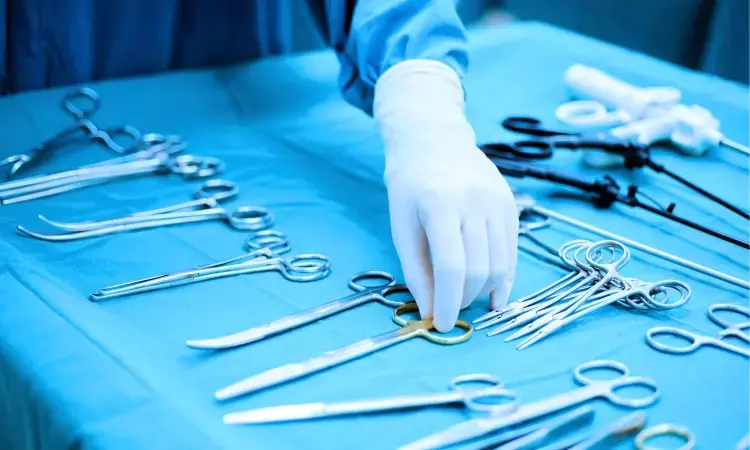- Home
- Medical news & Guidelines
- Anesthesiology
- Cardiology and CTVS
- Critical Care
- Dentistry
- Dermatology
- Diabetes and Endocrinology
- ENT
- Gastroenterology
- Medicine
- Nephrology
- Neurology
- Obstretics-Gynaecology
- Oncology
- Ophthalmology
- Orthopaedics
- Pediatrics-Neonatology
- Psychiatry
- Pulmonology
- Radiology
- Surgery
- Urology
- Laboratory Medicine
- Diet
- Nursing
- Paramedical
- Physiotherapy
- Health news
- Fact Check
- Bone Health Fact Check
- Brain Health Fact Check
- Cancer Related Fact Check
- Child Care Fact Check
- Dental and oral health fact check
- Diabetes and metabolic health fact check
- Diet and Nutrition Fact Check
- Eye and ENT Care Fact Check
- Fitness fact check
- Gut health fact check
- Heart health fact check
- Kidney health fact check
- Medical education fact check
- Men's health fact check
- Respiratory fact check
- Skin and hair care fact check
- Vaccine and Immunization fact check
- Women's health fact check
- AYUSH
- State News
- Andaman and Nicobar Islands
- Andhra Pradesh
- Arunachal Pradesh
- Assam
- Bihar
- Chandigarh
- Chattisgarh
- Dadra and Nagar Haveli
- Daman and Diu
- Delhi
- Goa
- Gujarat
- Haryana
- Himachal Pradesh
- Jammu & Kashmir
- Jharkhand
- Karnataka
- Kerala
- Ladakh
- Lakshadweep
- Madhya Pradesh
- Maharashtra
- Manipur
- Meghalaya
- Mizoram
- Nagaland
- Odisha
- Puducherry
- Punjab
- Rajasthan
- Sikkim
- Tamil Nadu
- Telangana
- Tripura
- Uttar Pradesh
- Uttrakhand
- West Bengal
- Medical Education
- Industry
Use of incisional negative pressure wound therapy may prevent post-sternotomy wound complications

Sternal wound infections (SWI) are uncommon but severe complications after cardiac surgery. This condition is associated with high mortality rates. Various strategies have been implemented to reduce the incidence of SWI, such as using rigid longitudinal sternal closures, administering topical antimicrobials, local antibiotics with prolonged release, etc. Despite these, the prevalence of SWI remains significant, with most studies reporting an incidence of 1% to 6%.
According to a recent study published in The American Journal of Surgery, standardized wound care protocol, including the universal application of negative pressure wound therapy ( NPWT )for cardiac surgery patients with median sternotomy, is an independent predictor of decreased sternal infection rates.
SWI is a source of morbidity and mortality following median sternotomy. The impact of incisional NPWT in prevention has yet to be elucidated.
This retrospective study was conducted following the implementation of universal wound care protocol, including the prophylactic use of NPWT. The primary endpoint was sternal infections within 90 days of the index operation.
The study results are:
- In the control period, the sternal infection rate was 3 % within 90 days compared to 0.8% in the intervention period.
- The odds ratio was 0.25 in the intervention period compared to the control period.
The study aimed to assess if incisional negative pressure wound therapy decreased the occurrence of surgical site infections in patients who underwent cardiac surgery with median sternotomy.
Based on the results of this study, using standardized wound care protocol, including the universal application of iNPWT for patients undergoing cardiac surgery with median sternotomy, is an independent predictor of decreased rates of SWI.
Reference:
Traylor, L., Bhatia, G., Blackhurst, D. W., Wallenborn, G., Ewing, A., Bolton, W. D., & Davis, B. R. (2023). Efficacy of incisional negative pressure therapy in preventing post-sternotomy wound complications. The American Journal of Surgery, 226(6), 762–767. https://doi.org/10.1016/j.amjsurg.2023.07.016
BDS, MDS in Periodontics and Implantology
Dr. Aditi Yadav is a BDS, MDS in Periodontics and Implantology. She has a clinical experience of 5 years as a laser dental surgeon. She also has a Diploma in clinical research and pharmacovigilance and is a Certified data scientist. She is currently working as a content developer in e-health services. Dr. Yadav has a keen interest in Medical Journalism and is actively involved in Medical Research writing.
Dr Kamal Kant Kohli-MBBS, DTCD- a chest specialist with more than 30 years of practice and a flair for writing clinical articles, Dr Kamal Kant Kohli joined Medical Dialogues as a Chief Editor of Medical News. Besides writing articles, as an editor, he proofreads and verifies all the medical content published on Medical Dialogues including those coming from journals, studies,medical conferences,guidelines etc. Email: drkohli@medicaldialogues.in. Contact no. 011-43720751


